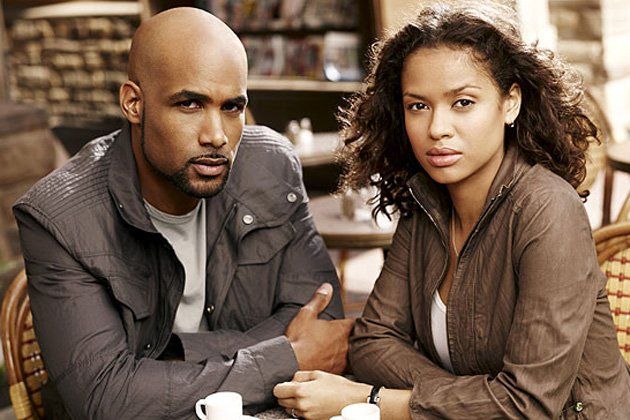
When a new J. J. Abrams show featuring two African-American leads was announced earlier this year, I was gleefully overtaken by the implications it could have. Honestly, when's the last time you've seen a prime-time network drama with two black people not only happily in love, but equipped with bilingual skills and a passport? Try never. Throw in the fact that Abrams was also the mastermind behind the megahit Lost, and you have the makings of a bona fide hit. Magazine ads and television commercials leading up to the show's premiere in October promised fast car chases, exotic international locales, and steamy love scenes. I had my PJs, comfy seat, and bowl of popcorn all ready for a regular Wednesday night escape. Unfortunately, I was in the minority. The show premiered to lukewarm numbers—fewer than 6 million viewers—and never caught on with black or white audiences. Last week NBC canceled Undercovers after just one month on the air.
On Web sites such as Entertainment Weekly's and Bossip theories ran amok as to why a flashy drama from a veteran producer sank before it could reach deep water. Some pointed to lack of star power, while a few fans complained of weak writing. Sure, all those things can cause any show's early demise, but I'm not convinced those very fixable creative flaws explain the show's short life span; ratings were low from the very first episode. I think it's possible that a slightly more obvious, disturbing reason could be behind Undercovers' failure, and it's pretty familiar: race. Prime-time audiences just weren't ready for "super-negros" on the small screen. And that's exactly what Undercovers was: a show about black people doing very "unblack" things. Before anyone gets upset, let me explain. "Super-negro" was a term my family often used while watching old Sidney Poitier movies back in the day. In Guess Who's Coming to Dinner (our favorite), Poitier portrays a black doctor in love with a white, wealthy young socialite during the '60s. Pretty early in the film, you begin to realize that Poitier's character is not just any black doctor (an accomplishment in itself for most people then, and now); he's a black doctor with degrees from several Ivy League universities, an internationally known scholar behind cures of dozens of diseases in Africa and elsewhere. Overkill. But Poitier portraying a "regular negro" was simply not good enough during those times, so the "super-negro" was born. The same could be said of his character from In the Heat of the Night, a Philadelphia cop with highly decorated awards.
Fast-forward 40 years, and it's plain to see that Hollywood still hasn't figured out a way to move beyond that absurd premise. It still can't just fit us in. Yes, we often appear as sidekicks or backup characters in an array of popular shows in prime time, but rarely do we carry a show as the star or let the viewers come home with us. One exception is Jada Pinkett Smith's turn as a no-nonsense nurse on the TNT show Hawthorne. Wonder why? It might have something to do with the fact that it's a show that she and her husband, Will Smith, created and executive produce. Otherwise, it appears that the powers that be in Tinseltown feel quite comfortable relegating us to reinforcing every negative stereotype known to humanity in low-grade, embarrassing reality shows like Flavor of Love and Basketball Wives. So exactly how does the television audience (black, white, or other) make the gigantic leap from those constant images of foolery to a show like Undercovers? It doesn't.
Not since the The Cosby Show has prime time successfully delivered a show featuring African-Americans leading normal, regular, everyday lives. That show was groundbreaking because it featured us as mothers, daughters, fathers, and sons. Can you name another show like that on the air right now? Not unless you count Tyler Perry's TBS comedies—but it's never been an issue for mainstream audiences to laugh at us. The same thing is true of the Chris Rock series Everyone Loves Chris, which enjoyed some success but is no longer on the air, or the cartoon The Cleveland Show. The brilliance of The Cosby Show was that while funny, it also changed the cultural landscape. It presented African-Americans in an entirely different and new context. It moved beyond the stereotypes of the inner city, jail cells, and basketball courts to present a more well-rounded look at who we are.
Somehow, I foolishly thought the election of the first African-American president would foster more interest in those types of African-American stories. Whatever anyone thinks of President Obama today, he and his wife Michelle's story of true love, family, and achievement is a fascinating tale with a very unexpected and ongoing twist. I was sure their example alone would inspire networks, producers, and writers to burst at the seams with ideas for shows depicting typical African-American couples and families. I was wrong. Unfortunately, NBC miscalculated as well. They expected the prime-time audience to accept African-Americans in extraordinary roles like Undercovers before really having had much of a chance to see us as ordinary people first.
Uncommon Knowledge
Newsweek is committed to challenging conventional wisdom and finding connections in the search for common ground.
Newsweek is committed to challenging conventional wisdom and finding connections in the search for common ground.
About the writer
To read how Newsweek uses AI as a newsroom tool, Click here.








